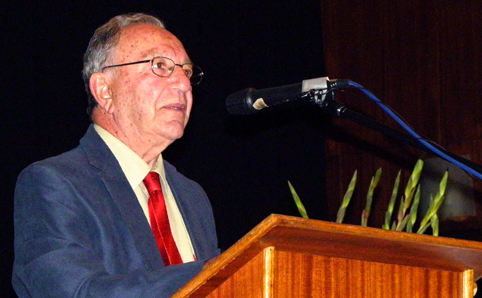Latest News Archive
Please select Category, Year, and then Month to display items
01 June 2023
|
Story Nicole Bongo
|
Photo Supplied
 University of the Free State students participating in one of the many projects coordinated by the Engaged Scholarship Office.
University of the Free State students participating in one of the many projects coordinated by the Engaged Scholarship Office.
To help make a change and push for sustainable development, the University of the Free State Division of Student Affairs works with communities around Bloemfontein fostering a culture of creating sustainable solutions.
Gernus Terblanche, Kovsie Support Services and Assistant Researcher in the Division says, ‘it is important for the university to be actively involved in the community as it makes up such a large portion of the Bloemfontein and students also
represent many different communities on and off- campus.’
Terblanche said: “As an educational institution it is vital for the UFS to support and guide students towards creating innovative solutions; both local and globally. Our experience is that students often come up with real solutions that can
make a real impact in the lives of real people – and it would be crucial to support such initiatives.”
The office has worked with BloemShelter, VermiVillage, GAP Equip, National Hospital and as part of the programmes of 2022 also with Lighuis, Talita Cumi, ROC Kids and the Universitas Neighborhood association. “We are also very fortunate to have,
Shanen Emam, Miss Free State 2023 as one of our students that are involved with our programmes,” added Terblanche.
One of the students involved is Prince Sijane, Bloemfontein Campus Student Representative Council member responsible for Civic and Social Responsibility when asked why student participation is important, he said, “By actively participating in
initiatives that address social issues or promote community well-being, students become more aware of the challenges faced by society.”
Tereblanche said: “The produce of these gardens addresses hunger and malnutrition amongst students on campus. KovsieACT also facilitates an eco-vehicle project during which student teams learn how to build electric vehicles powered by solar charging
stations. This project is aimed at developing skills appropriate to the 4th Industrial Revolution and sustainable resources development including clean and green energy.”
UFS hosts final ANC Centenary Seminar for 2011
2011-11-28
 |
|
Prof. Benjamin Turok speaking about the Evolution of Economic Policy Thinking.
Photo: Henco Myburgh
|
The African National Congress (ANC) government is faced with the dilemma of an inherited distorted economy. Subsequently South Africa has the most unequal society in the world. That is according to Prof. Benjamin Turok, head of Political Education for the ANC in Parliament. Prof. Turok spoke at an ANC Centenary Dialogue at the Bloemfontein Campus of the University of the Free State (UFS) on 23 November 2011.
Delivering the last lecture of the year in a series of dialogues about the ANC, Prof. Turok said it was hard to swallow that after 100 years there is still inequality. This for a party whose essence is the notion of sharing, as set out in the Freedom Charter. Prof. Turok told the audience in a packed Odeion Theatre that the ANC Centenary provided a moment of reflection. “If we neglect the poor and uneducated and do not interfere and direct investment, we will always have inequality.”
Talking about youth unemployment, Prof. Turok said that no society can live in peace if young people are not employed. He said that he welcomed the energy the ANC Youth League has put in economic policy, but would like to see a youth league economic policy that is scientific.
The ANC Centenary Dialogue series has been hosted by the Centre for Africa Studies and will continue on 15 February 2012.